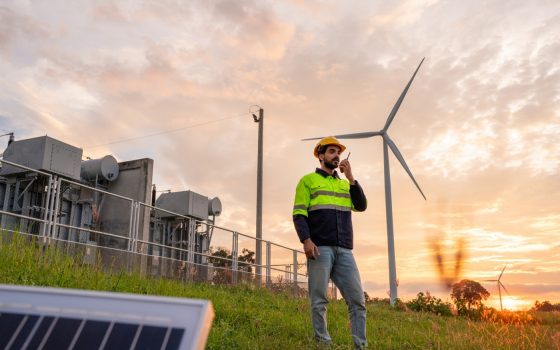All eyes on us
The Glasgow climate summit is a golden opportunity for the UK to sell its climate leadership internationally — and at home.
26 April 2021
It was raining targets at the recent Earth Day climate leaders summit. President Biden announced a bold target of halving America’s emissions by 2030 (compared to 2005 levels) while Canada and Japan made similar announcements. These countries have a notorious reputation for dragging their feet at international climate negotiations and blocking meaningful progress and their new targets still don’t add up to a world that is safe from the ravages of the climate emergency, as the window for limiting global temperature rise to 1.5 degrees closes quickly. Inaction, however, seems to be gradually thawing.
Boris Johnson, in his typically awkward and colourful choice of phrases, laid out possibly one of the most ambitious targets from a rich country: committing to cut UK’s carbon emissions 78% by 2035 (compared to 1990 levels). I would never have expected a government led by someone who not so long ago opined that wind turbines “couldn’t pull the skin off a rice pudding” to take the climate crisis seriously. Yet we now find ourselves led by a Conservative government that has effectively brought our former 2050 carbon target forward by 15 years, dramatically upping our ambition and demanding a significant change to the way we travel, eat and heat our homes.
Legislating this new target is just the first step. The upcoming Glasgow COP climate summit presents a golden opportunity for the UK to sell its climate leadership not just internationally but domestically, particularly in the wake of the pushback these new targets are receiving. Right-wing commentators don’t tire of asking ‘who will pay?’ and ‘why is the government intervening in our personal lives?’, but a new go-to argument since 2019 has been the spectre of the PM losing his newfound ‘red wall’ constituents if he doesn’t slow down with his climate targets.
The reality of course is different. Recent polling from Centre for Towns highlights that a majority of red wall constituents are not just concerned about climate but think the government hasn’t gone far enough to protect the environment. But while concern for the environment remains very high, it is worth worrying about the fact that the full implications of these targets are yet to be clearly communicated with the public. The press release for the new target says that “The government will look to meet this reduction target through investing and capitalising on new green technologies and innovation, whilst maintaining people’s freedom of choice, including on their diet”. This highlights the tightrope the government is treading, careful to not fuel any flames of polarising public opinion while relying on technological solutions to save the day.
“… a majority of red wall constituents are not just concerned about climate but think the government hasn’t gone far enough to protect the environment”
The UK has certainly been successful in decarbonising its electricity supply through clean technology- but if it believes that it can hit its new target through the same approach that it took in cleaning up the power sector — ie, out of sight and out of mind — it may be in for a rude shock.
The allure of big-kit, centralised solutions like carbon capture, hydrogen and bioenergy is very high and though these technologies will play a vital role in the transition to net zero, they don’t replace the need to install close to a million heat pumps a year by 2030, cut our meat consumption by a fifth, or drive and fly less — things that will require individuals to change their ways of life. These diverse steps towards cutting carbon are the most sensible option, but will require a careful and honest conversation with the public.
However, the recent political and public consensus we’ve built on climate is fragile and can come crashing down. The UK’s climate leadership, despite valid criticisms, is acknowledged globally. But sustaining this consensus domestically will be challenging without enabling individuals and communities in the UK to embody that leadership too, to benefit from positive local climate action and have a stake in collective action on climate.
“… the recent political and public consensus we’ve built on climate is fragile and can come crashing down.”
The 2020s have been dubbed as the ‘decade of delivery’ when it comes to tackling the climate crisis. With the runup to COP, the UK government should use the significant media attention on climate change this year to deliver on three things: publish a comprehensive net-zero strategy to back its ambitious targets, offer a new deal and a fair transition for workers and communities, highlighting how the transition can benefit them directly, and launch a nationwide communications strategy to ‘level with’ people on what net zero really means and how it can benefit them. The white papers and policy documents that will be published over the course of the coming months should all carry a blueprint on how the public will be engaged through this transition.
The prime minister’s dismissal of environmentalist concerns as “politically-correct” “bunny-hugging” and this rhetoric of ‘cake-eating’ ’ might be useful in the short term to bring his conservative constituents and commentariat along, but when the delivery of net zero faces hiccups or falters, they will be the first to turn on the PM and say ‘I told you so’. The government’s only choice to sustain this fragile consensus on climate is decisive leadership that particularly enables the public to be active participants in the solutions as opposed to passive recipients of policy change.
Image: Ashden (CC BY-NC-ND 2.0)
Topics Climate change Environment






